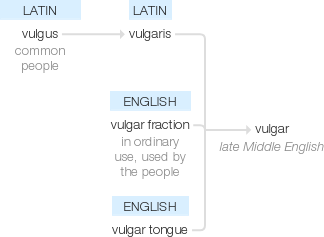Vulgar
late Middle English: from Latin vulgaris, from vulgus ‘common people’. The original senses were ‘used in ordinary calculations’ (surviving in vulgar fraction) and ‘in ordinary use, used by the people’ (surviving in vulgar tongue).
wiktionary
Borrowed into Middle English from Latin vulgāris, from volgus, vulgus(“mob; common folk”), from Proto-Indo-European *wl̥k- (compare Welsh gwala(“plenty, sufficiency”), Ancient Greek ἁλία(halía, “assembly”) εἰλέω(eiléō, “to compress”), Old Church Slavonic великъ(velikŭ, “great”).
etymonline
vulgar (adj.)
late 14c., "common, ordinary," from Latin vulgaris, volgaris "of or pertaining to the common people, common, vulgar, low, mean," from vulgus "the common people, multitude, crowd, throng," perhaps from a PIE root *wel- "to crowd, throng" (source also of Sanskrit vargah "division, group," Greek eilein "to press, throng," Middle Breton gwal'ch "abundance," Welsh gwala "sufficiency, enough") [not in Watkins]. Meaning "coarse, low, ill-bred" is first recorded 1640s, probably from earlier use (with reference to people) with meaning "belonging to the ordinary class" (1530). Chaucer uses peplish for "vulgar, common, plebeian" (late 14c.). Related: Vulgarly.
What we have added to human depravity is again a thoroughly Roman quality, perhaps even a Roman invention: vulgarity. That word means the mind of the herd, and specifically the herd in the city, the gutter, and the tavern. [Guy Davenport, "Wheel Ruts"]
For Vulgar Latin, see here.
